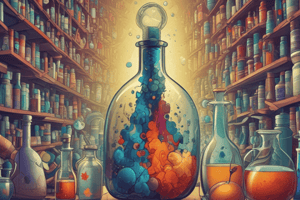Podcast
Questions and Answers
What does Medical Pharmacology focus on?
What does Medical Pharmacology focus on?
- Drug synthesis and formulation
- Investigation of drug interactions
- Analysis of adverse effects and potential toxicity of drugs
- Prevention, diagnosis, and treatment of diseases using drugs (correct)
Clinical Pharmacology investigates drug interactions.
Clinical Pharmacology investigates drug interactions.
True (A)
What is toxicology?
What is toxicology?
Analysis of the adverse effects and potential toxicity of drugs
What does pharmacokinetics describe?
What does pharmacokinetics describe?
Which of the following is a natural source of drugs?
Which of the following is a natural source of drugs?
What is the example of a glycoside derived from foxglove plants?
What is the example of a glycoside derived from foxglove plants?
What is a semisynthetic drug?
What is a semisynthetic drug?
____ is derived from the pancreas and is essential for blood sugar regulation.
____ is derived from the pancreas and is essential for blood sugar regulation.
Match the following natural compounds with their sources:
Match the following natural compounds with their sources:
Flashcards are hidden until you start studying
Study Notes
Medical Pharmacology
- Focuses on preventing, diagnosing, and treating diseases using drugs.
Clinical Pharmacology
- Studies drug interactions, including effects of different administration routes and interactions with food.
- Analyzes unwanted side effects of medications.
Toxicology
- Examines the adverse effects and potential toxicity of drugs.
Pharmaceutical Pharmacology
- Focuses on the synthesis and formulation of drugs.
Pharmacogenetics
- Investigates how genetic variations influence individual responses to drugs and their metabolism.
Experimental Pharmacology
- Uses experimentation, often with animal models, to test drug activity and metabolism.
Pharmacokinetics
- Describes the journey of a drug from administration to its target site and elimination from the body.
- Involves three key processes:
- Input: Absorption and Administration
- Distribution: Spread through the body
- Elimination: Removal from the body
Pharmacodynamics
- Explores the effects of a drug after it reaches its target site, including the mechanisms of action.
Dose-Effect Relationship
- Divided into two components:
- Pharmacokinetics: Relationship between dose and concentration.
- Pharmacodynamics: Relationship between concentration and effect.
Sources of Drugs
- Natural Sources:
- Plants:
- Glycosides: Digoxin from foxglove plants, used for cardiac conditions.
- Alkaloids: -Morphine from poppy capsules, used for pain relief. -Atropine from belladonna leaves, used for various medical conditions. -Quinine from cinchona bark, used for malaria treatment.
- Castor Oil: Derived from castor beans, used as a laxative and in other applications.
- Animal Sources (for Hormones): -Heparin: Sourced from the liver of oxen or pigs, used as an anticoagulant. -Insulin: Extracted from the pancreas, essential for blood sugar regulation. -Thyroxine: obtained from the thyroid gland, crucial for metabolic regulation. -Gonadotropin: Sourced from the urine of pregnant women, used in fertility treatments.
- Microorganisms (antibiotics): -Penicillin: Derived from Penicillium notatum. -Streptomycin: Sourced from Streptomyces griseus. -Bacitracin: Obtained from Bacillus species.
- Minerals: -Paraffin: Derived from petroleum, used in various pharmaceutical applications.
- Plants:
Semisynthetic Drugs
- Created through chemical modifications of natural compounds.
- Employ techniques such as substitution, insertion, and dilution.
- Ampicillin: Modified form of penicillin, enhanced for greater efficacy.
- Cephalosporins: Derived from cephalosporin, with structural modifications to improve activity and spectrum.
Studying That Suits You
Use AI to generate personalized quizzes and flashcards to suit your learning preferences.



